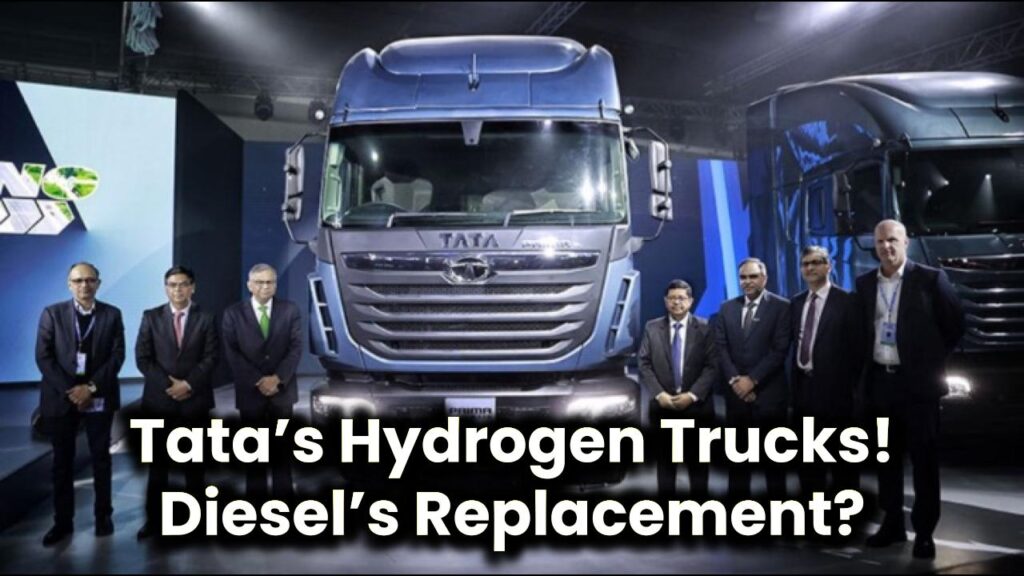
Tata Motors, one of India’s largest automobile manufacturers, has recently unveiled its hydrogen-powered trucks, marking a significant step towards sustainable transportation. As the world moves towards cleaner energy solutions, hydrogen-powered vehicles have gained momentum as a potential alternative to diesel trucks. But can these hydrogen trucks truly replace diesel-powered freight vehicles?
In this article, we will break down the concept of hydrogen-powered trucks, their benefits, challenges, and whether they can practically replace diesel in the transportation industry.
Tata Motors Unveils Hydrogen Trucks
| Feature | Details |
|---|---|
| Manufacturer | Tata Motors |
| Technology | Hydrogen Internal Combustion Engine (H2-ICE) & Hydrogen Fuel Cells |
| Vehicle Model | Tata Prima H.28 |
| Range | ~550 km per refueling |
| Emission | Zero carbon emissions |
| Refueling Time | ~15 minutes |
| Infrastructure Challenge | Limited hydrogen refueling stations |
| Potential Diesel Replacement? | Viable with infrastructure expansion |
| Official Website | Tata Motors |
Tata Motors’ hydrogen-powered trucks represent a huge step forward in India’s sustainable transport landscape. While diesel remains dominant, hydrogen offers a promising alternative with benefits like zero emissions, long range, and fast refueling. However, infrastructure development and cost reductions are needed before hydrogen can fully replace diesel.
As governments and industries push towards clean energy, Tata Motors’ innovation in hydrogen trucks could be a game-changer for the future of transportation.
Understanding Hydrogen Trucks
What is a Hydrogen Truck?
Hydrogen-powered trucks use hydrogen as fuel to generate energy either through fuel cells or internal combustion engines (H2-ICE). These trucks emit only water vapor, making them an eco-friendly alternative to diesel-powered vehicles.
Types of Hydrogen-Powered Trucks
- Hydrogen Fuel Cell Trucks (FCEV) – These use a fuel cell that converts hydrogen into electricity, which powers the electric motor.
- Hydrogen Internal Combustion Engine Trucks (H2-ICE) – These work similarly to diesel engines but use hydrogen instead of fossil fuels.
Tata Motors is actively developing both FCEV and H2-ICE trucks, with its Tata Prima H.28 being one of India’s first hydrogen-powered commercial vehicles.
Why is Tata Motors Investing in Hydrogen Trucks?
Environmental Benefits
- Zero Carbon Emissions – Hydrogen trucks only emit water vapor, significantly reducing air pollution.
- Energy Efficiency – Hydrogen is a renewable fuel that can be produced from green energy sources like wind and solar power.
- Reduction in Fossil Fuel Dependency – Helps in reducing reliance on diesel and decreasing import costs.
Performance & Efficiency
- Long Range – The Tata Prima H.28 has a range of 550 km per refueling, comparable to diesel trucks.
- Quick Refueling – Unlike electric trucks, hydrogen vehicles can be refueled in just 10-15 minutes.
- High Load Capacity – Hydrogen-powered trucks can carry heavy freight loads similar to diesel-powered vehicles.
Challenges Hindering Hydrogen Truck Adoption
1. Lack of Hydrogen Refueling Infrastructure
One of the biggest challenges is the limited availability of hydrogen refueling stations. Unlike diesel, hydrogen refueling stations are scarce, making long-haul transport difficult.
2. High Production Costs
- Hydrogen production is currently expensive due to limited large-scale green hydrogen production.
- Fuel cells and H2-ICE engines require advanced technology, leading to higher vehicle costs.
3. Safety Concerns
Hydrogen is highly flammable, requiring special handling and storage infrastructure. However, advancements in hydrogen storage safety are addressing these concerns.
4. Government Policies & Regulations
- Large-scale hydrogen adoption depends on government support.
- Policies for hydrogen fuel subsidies, infrastructure development, and vehicle incentives are crucial.
5. Competition from Electric Vehicles (EVs)
- Battery-powered electric trucks are also emerging as a clean alternative to diesel.
- EVs have better infrastructure support compared to hydrogen refueling stations.
Global Trends in Hydrogen Truck Adoption
Countries Leading Hydrogen Truck Development
- Germany – Daimler and Volvo are investing heavily in hydrogen truck production.
- Japan – Toyota and Hino Motors are developing hydrogen fuel cell trucks.
- USA – Companies like Nikola and Hyundai are testing hydrogen trucks.
- India – Tata Motors, in collaboration with Indian Oil Corporation, is launching hydrogen-powered trucks.
Investment in Hydrogen Infrastructure
- Countries are investing billions in hydrogen refueling stations.
- Hydrogen corridors are being planned for long-haul transport.
Can Hydrogen Trucks Replace Diesel?
Where Hydrogen Trucks Have an Edge
- Long-haul transportation – Suitable for highways and logistics where quick refueling is necessary.
- Sustainability goals – Helps companies achieve net-zero emissions.
- Government support – Countries like India, Germany, and Japan are investing in hydrogen fuel infrastructure.
Where Diesel Still Dominates
- Established fuel infrastructure – Diesel is widely available and cheaper in most markets.
- Cost factor – Initial investment in hydrogen trucks and refueling stations is significantly higher.
The Future Outlook
While diesel trucks will continue to dominate in the near term, hydrogen-powered trucks can play a crucial role in the future of sustainable transportation. As infrastructure improves, and costs decrease, hydrogen trucks can become a mainstream solution.
FAQs About Tata Motors Unveils Hydrogen Trucks
1. How much does a hydrogen truck cost?
Currently, hydrogen trucks are more expensive than diesel trucks, with costs varying based on technology, fuel cell size, and region.
2. How long does it take to refuel a hydrogen truck?
It takes about 10-15 minutes to refuel a hydrogen truck, making it comparable to diesel trucks.
3. Are hydrogen trucks better than electric trucks?
Both have their advantages. Electric trucks are suitable for short-haul and city driving, while hydrogen trucks are better for long-distance freight transport due to faster refueling times.
4. Is hydrogen fuel safe?
Yes, with proper storage and handling. Hydrogen storage technology is improving, making it a safe and viable fuel option.
5. When will hydrogen trucks become widely available?
With increasing investments and policy support, hydrogen trucks could become more common in the next 5-10 years.
6. What are the major companies investing in hydrogen trucks?
Companies like Tata Motors, Toyota, Daimler, Hyundai, and Nikola are actively investing in hydrogen-powered truck development.







